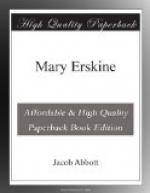A few days after this, Mr. Gordon came home one evening, and told Anne Sophia, with a countenance expressive of great surprise and some little vexation, that her old friend, Mrs. Forester, had bought their house, and was going to move into it. Anne Sophia was amazed at this intelligence, and both she and her husband were thrown into a state of great perplexity and trouble. The next morning Anne Sophia went out to see Mary Erskine about it. Mary Erskine received her in a very kind and cordial manner.
“I am very glad to see you,” said Mary Erskine. “I was coming to your house myself in a day or two, about some business, if you had not come here.”
“Yes,” said Anne Sophia. “I understand that you have been buying our house away from over our heads, and are going to turn us out of house and home.”
“Oh, no,” said Mary Erskine, smiling, “not at all. In the first place, I have not really bought the house yet, but am only talking about it; and in the second place, if I buy it, I shall not want it myself, but shall wish to have you live in it just as you have done.”
“You will not want it yourself!” exclaimed Anne Sophia, astonished.
“No,” said Mary Erskine, “I am only going to buy it as an investment.”
There were so many things to be astonished at in this statement, that Anne Sophia hardly knew where to begin with her wonder. First, she was surprised to learn that Mary Erskine had so much money. When she heard that she had bought the house, she supposed of course that she had bought it on credit, for the sake of having a house in the village to live in. Then she was amazed at the idea of any person continuing to live in a log house in the woods, when she had a pretty house of her own in the middle of the village. She could not for some time be satisfied that Mary Erskine was in earnest in what she said. But when she found that it was really so, she went away greatly relieved. Mary Erskine told her that she had postponed giving her final answer about buying the house, in order first to see Mr. Gordon, to know whether he had any objection to the change of ownership. She knew, of course, that Mr. Gordon would have no right to object, but she rightly supposed that he would be gratified at having her ask him the question.
Mary Erskine went on after this for two or three years very prosperously in all her affairs. Thomas continued to live with her, in her log-house, and to cultivate the land which she had retained. In the fall and winter, when there was nothing to be done in the fields or garden, he was accustomed to work in the shop, making improvements for the house, such as finishing off the stoop into another room, to be used for a kitchen, making new windows to the house, and a regular front door, and in preparing fences and gates to be put up around the house. He made an aqueduct, too, to conduct the water from a new spring which he discovered at a place higher




